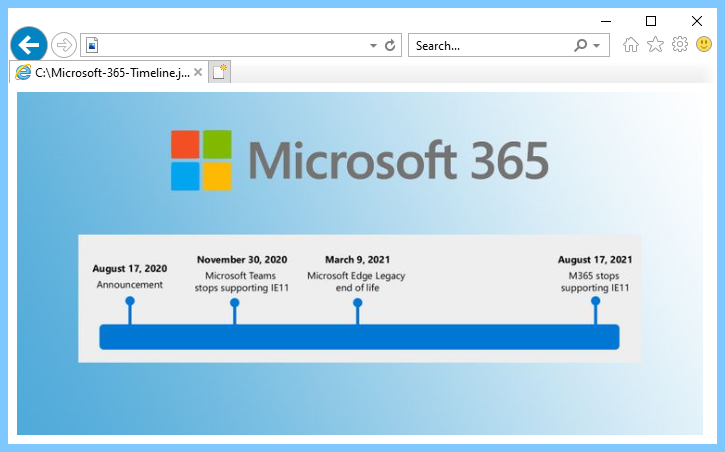IE's Legacy: MS Internet Explorer 11

Explore the impact and lasting legacy of Microsoft Internet Explorer 11 - from its rise to its eventual fall from grace.
Table of Contents
Introduction: The Journey of Internet Explorer
Internet Explorer 11, also known as IE 11, holds a special place in the history of web browsing. Developed by Microsoft, it has been a key player in shaping how we access and experience the internet. Let's take a closer look at the journey of Internet Explorer 11 and its significant role in the digital world.
Since its inception, Microsoft Internet Explorer 11 has been at the forefront of providing users with a smooth and secure browsing experience. Its evolution over time has mirrored the advancements in technology and the ever-changing landscape of the internet.
The Birth of Internet Explorer 11
Internet Explorer 11, also known as IE 11, holds a special place in the history of web browsers. Let's take a journey back in time to explore how this browser came into existence and why it became so important.
What Made IE 11 Special
When Internet Explorer 11 was first launched by Microsoft, it brought in a range of new features and technologies that set it apart from its predecessors. Improved performance, better security measures, and enhanced compatibility with modern web standards were some of the key highlights of IE 11.
Internet Explorer's Compatibility with Windows
One of the standout features of Internet Explorer 11 was its seamless integration with various versions of Windows, including the widely-used Windows 10 Operating system. This compatibility ensured that users could enjoy a smooth browsing experience tailored to their Windows environment.
Internet Explorer 11 and Windows 10
Diving into the relationship between Internet Explorer 11 and Windows 10, let's explore how these two components work together seamlessly to provide a smooth browsing experience for users.

Image courtesy of www.my-internet-explorer.com via Google Images
The Transition to Windows 10
When Windows 10 was introduced, Microsoft made sure that Internet Explorer 11 was fully compatible with this new operating system. This transition was essential to ensure that users could continue to rely on Internet Explorer for their browsing needs without any glitches or interruptions.
User Experience on Windows 10
Using Internet Explorer 11 on a Windows 10 system offers users a familiar and user-friendly experience. The browser integrates seamlessly with the operating system, allowing for quick access to favorite websites, smooth navigation, and enhanced security features to protect users while browsing online.
The Future and Windows 11
As technology progresses, so do web browsers. The shift from Internet Explorer to newer options like Microsoft Edge is a big step forward in the evolution of browsing. Let's take a look at what this means for Windows 11 users.
| Version | Release Date | End of Support |
|---|---|---|
| Internet Explorer 11 | October 17, 2013 | August 17, 2021 |
Internet Explorer's Role in Windows 11
With the launch of Windows 11, Microsoft has officially phased out Internet Explorer in favor of their newer browser, Microsoft Edge. This means that users will no longer have Internet Explorer as the default browser on their Windows 11 systems. Microsoft Edge offers enhanced features, improved security, and better performance compared to Internet Explorer, making it a more suitable and modern choice for browsing.
Is Windows 11 Free for Internet Explorer Users?
For those who have been using Internet Explorer 11 on Windows 10, the good news is that upgrading to Windows 11 is free for eligible devices. This transition not only gives users access to the latest features and improvements of Windows 11 but also ensures better compatibility and support for modern web applications. It's a great opportunity to explore the new possibilities that Windows 11 and Microsoft Edge bring to the table.
Support for Internet Explorer 11 and Office 2013
Internet Explorer 11 has been a longstanding browser that many users have relied on, especially in conjunction with Office 2013. As Windows 11 introduces new changes and features, compatibility with these older versions may present challenges. While Internet Explorer 11 and Office 2013 can still function on Windows 11, some issues may arise due to the outdated nature of these applications.

Image courtesy of techcommunity.microsoft.com via Google Images
Alternatives and Updates
For users facing compatibility issues with Internet Explorer 11 and Office 2013 on Windows 11, it is advisable to consider alternatives that offer better support and integration. Microsoft Edge, the successor to Internet Explorer, is a modern and secure browser that is optimized for Windows 11. Additionally, updating to the latest version of Office, such as Office 365, can provide a seamless experience with Windows 11 and ensure ongoing support and updates.
Conclusion: Navigating Beyond Internet Explorer 11
As we reach the end of our exploration into the world of Internet Explorer 11, it's important to reflect on the journey we've taken. Internet Explorer 11 has been a significant player in the realm of web browsers, serving as a familiar companion to many users navigating the online landscape. However, as technology continues to evolve, so must our tools and browsers.
Looking ahead, the future of web browsing no longer revolves around Internet Explorer 11. With the introduction of Windows 11, Microsoft has paved the way for a new era of browsing with Microsoft Edge as the default browser. This shift signifies a departure from the past and a step towards innovation and enhanced user experiences.
For those who have grown accustomed to Internet Explorer 11, the transition to Microsoft Edge on Windows 11 may require some adjustment. However, with its modern features, improved performance, and enhanced security measures, Microsoft Edge offers a seamless and efficient browsing experience that aligns with the requirements of today's internet users.
While bidding farewell to Internet Explorer 11 may evoke nostalgia for some, embracing the future of browsing with Microsoft Edge on Windows 11 opens up a world of opportunities for enhanced productivity, connectivity, and exploration on the web. So, as we navigate beyond Internet Explorer 11, let us embrace the change and look forward to a more sophisticated and streamlined browsing experience.
FAQs: Questions About Internet Explorer 11
Can I still use Internet Explorer 11 on Windows 11?
Unfortunately, Internet Explorer 11 is not supported on Windows 11. Microsoft has shifted its focus to the Microsoft Edge browser, which offers more modern features and security updates. If you upgrade to Windows 11, you will need to use Microsoft Edge or another compatible browser.
How do I switch from Internet Explorer 11 to another browser?
To switch from Internet Explorer 11 to another browser like Microsoft Edge, Google Chrome, or Mozilla Firefox, you can simply download and install the new browser on your computer. Once the new browser is installed, you can set it as your default browser in the settings menu. This way, when you click on links or open web pages, they will automatically open in your new preferred browser.
What happens to my bookmarks and history when I stop using Internet Explorer 11?
When you stop using Internet Explorer 11 and switch to a different browser, you can usually import your bookmarks and browsing history into the new browser. Most browsers have built-in tools or options to transfer your bookmarks and history from one browser to another. This makes it easy to continue browsing seamlessly without losing your saved websites or past browsing activities.
Is Internet Explorer 11 safe to use?
While Internet Explorer 11 is still functional for some tasks, it is no longer receiving security updates from Microsoft. This makes it less secure compared to modern browsers like Microsoft Edge, Google Chrome, or Mozilla Firefox. For a safer and more secure browsing experience, it is recommended to use a browser that is regularly updated with the latest security features to protect your data and privacy while surfing the web.


